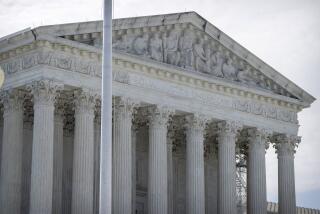State Claims Ruling Kills Harris Appeal : Law: U.S. Supreme Court decision to limit challenges may affect hearing sought by San Diego murderer.
Saying that Tuesday’s U.S. Supreme Court ruling undercut Robert Alton Harris’ latest claims, state prosecutors urged a San Diego federal judge Thursday to short-circuit an upcoming hearing in the case and reopen the way to execute the double murderer.
Defense lawyers said they had not yet waded through the Supreme Court ruling. But they insisted, in their own legal briefs, that the May 7 hearing had to go forward, contending that Harris would show that authorities violated his rights by recruiting a former cellmate to testify falsely against him at his trial 12 years ago.
The U.S. 9th Circuit Court of Appeals ordered the hearing last month, saying Harris deserved a chance to explore his claims of an illegal snitch. Senior U.S. District Judge William B. Enright in San Diego, scheduled to preside over the hearing, asked for the briefs.
Harris, 37, was convicted and sentenced to death for the murders of John Mayeski and Michael Baker, both 16, in 1978. He killed the boys after using their car for a bank robbery. Later he ate their half-finished hamburgers.
If Harris loses in his current round of appeals, he could become the first person executed in California in 24 years. If the courts find that his constitutional rights were violated, he could win a new trial.
In his newest claims, first raised last November, Harris contends that his lawyers found new evidence that informant Joey Dee Abshire acted as a “police agent.” Those lawyers include San Diego attorneys Charles M. Sevilla and Michael J. McCabe, and San Francisco lawyer Michael Laurence.
The defense team alleges that Abshire was placed in Harris’ cell before the trial to elicit statements showing that Harris killed the two teen-age boys to prevent them from testifying against him in a robbery. Abshire’s testimony revealed Harris’ motive, the defense claims, and was critical in enabling the prosecution to obtain the death penalty.
Since 1964, Supreme Court rulings forbid a police officer or “agent” from talking to a criminal defendant after formal charges have been filed, if the accused’s lawyer is not present.
In the brief filed Thursday, the defense also claimed it would show at the hearing that Abshire had his own motives, alleging that he cut a deal with prosecutors but lied about it on the stand.
The defense said that prosecutors instructed him to testify falsely and agreed, in exchange for his testimony, to dismiss various charges against him and to urge a light sentence--that eventually was given--on a burglary charge.
Prosecutors said all of this was nonsense, but that the Supreme Court ruling made it moot. Under the Tuesday ruling, Harris had no right to the hearing, since he raised the Abshire issue too late, said Deputy Atty. Gen. Louis Hanoian.
Aiming to cut down on repeated federal reviews of state court convictions, the Supreme Court ruled that defense attorneys must conduct reasonable investigations early into claims like the Abshire issue, Hanoian said.
A reasonable investigation by Harris’ defense team could have and should have led years ago to Abshire, Hanoian said. Last November simply was too late, he said.
Though defense lawyers had no comment in their brief on the new ruling, they have indicated that they did not raise Abshire’s claims earlier because they discovered them just last year.
If there is a hearing, Hanoian said, Abshire’s claims will not prove credible. To believe him, Hanoian said, Judge Enright would have to “pick the time of Abshire’s perjury.” Either Abshire lied at trial or he was lying now, Hanoian said.
Beyond that, Hanoian said, prosecutors at Harris’ trial had no reason to use Abshire to bolster their case. It already included multiple confessions by Harris himself and by his brother, as well as overwhelming circumstantial evidence, Hanoian said.
More to Read
Sign up for Essential California
The most important California stories and recommendations in your inbox every morning.
You may occasionally receive promotional content from the Los Angeles Times.









